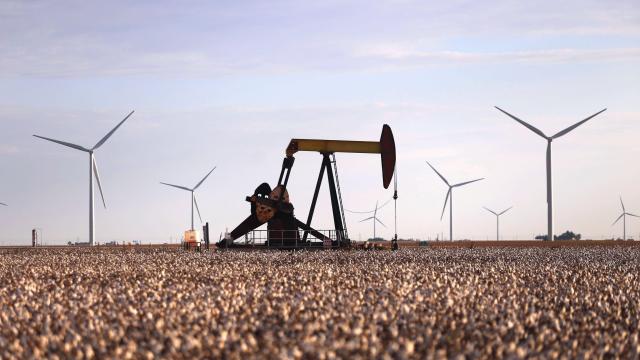Texas Republicans are messing with the state’s grid to fulfil their political ambitions. Again.
Ahead of the 2023 legislative session, Lieutenant Governor Dan Patrick has made it clear that one of his priorities for the upcoming year is increasing natural gas production to, supposedly, stabilise the grid. Patrick has told multiple media outlets in recent weeks that he will push this spring for the legislature to form a plan to build more natural gas plants — potentially forcing renewables providers to help foot the bill.
“We still need more power. We just have to do that. We have plenty of cheap, natural gas under the ground,” he said in an interview with KXXV this week as he discussed the reforms to the Texas grid . “Renewables are fine. They help the environment, help lower the cost of energy, but we don’t have enough dispatchable power. That means when we turn on the light switch, the lights come on. When you turn on your AC or furnace, it comes on because it’s reliable.”
There are some real conversations to be had around making sure the grid is reliable and has enough baseload power for when wind and solar aren’t available. Unfortunately, legislation that simply mandates more production — especially any legislation proposed by those with a vested interest in promoting oil and gas interests — far oversimplifies the issues that are facing the state’s grid.
Texas’s grid failed during a winter storm in February 2021 that caused widespread blackouts and hundreds of deaths. The cause of the blackouts was multifold and included equipment unprepared for freezing temperatures and the failure of natural gas infrastructure. However, in the nearly two years since the storm, Governor Greg Abbott’s leadership has taken every opportunity to blame renewables for the grid’s failure — including helping to spread false rumours that frozen wind turbines were responsible for the blackouts. (Some of these efforts were encouraged by fossil fuel interests.)
Patrick, in particular, has a history of trying to use the legislature to tie the hands of renewables and promote fossil fuels. After the storm, during the last legislative session (the Texas Legislature meets once every other year) he backed a bill that would have imposed new fees on wind and solar energy. While that bill failed to pass, Patrick also (successfully) pitched a bill that prohibits Texas from doing business with companies that “boycott” the oil and gas industry, which inspired a series of similar bills in other states.
At the same time that Patrick is pitching this yes-more-gas approach, the folks actually in charge of the grid are trying to make some major decisions to avoid future disasters. The state’s Public Utility Commission suggested a new proposal to make serious changes to the grid that would mandate power providers buy credits as a way to ensure power during peak demand; this plan, as E&E News reported this week, “would favour thermal plants fuelled by natural gas, coal and nuclear energy.” But there are lots of questions around the feasibility of this plan: A bipartisan set of lawmakers sent a letter to the PUC expressing concerns around the proposal.
And all of this is happening as renewables are, for lack of a better word, thriving in Texas. The International Energy Agency this month predicted that wind and solar will make up the largest share of electricity in the state next year, pushing natural gas use down. Legislation or policies that actively punish renewables generation could do serious damage to cheap and clean sources of energy.
The challenges facing Texas’s grid are complex and don’t boil down to some sort of battle between fossil fuels and renewables; it will take careful considerations and major policy decisions to tackle its problems. Unfortunately, Republican lawmakers like Patrick have proven time and again that they are determined to politicize these conversations — to paint fossil fuels as good and renewables as bad — and gloss over the details in favour of helping out their fossil fuel funders.
